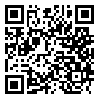Volume 23, Issue 68 (3-2023)
jgs 2023, 23(68): 427-444 |
Back to browse issues page
Download citation:
BibTeX | RIS | EndNote | Medlars | ProCite | Reference Manager | RefWorks
Send citation to:



BibTeX | RIS | EndNote | Medlars | ProCite | Reference Manager | RefWorks
Send citation to:
Hamedani P, Rajabi A. (2023). Factors Affecting Vulnerability of Urban Space with Crisis Management Approach Case Study: Robat Karim City. jgs. 23(68), : 24 doi:d10.52547/jgs.23.68.427
URL: http://jgs.khu.ac.ir/article-1-3883-en.html
URL: http://jgs.khu.ac.ir/article-1-3883-en.html
1- M.Sc. Student of Regional Planning, Department of Urban Planning, Science and Research Branch, Islamic Azad University, Tehran, Iran., Islamic Azad University, science and research unite, Tehran, Iran
2- Associate Professor, Department of Geography and Urban Planning, Central Tehran Branch, Islamic Azad University, Tehran, Iran, Islamic Azad University, Central Tehran Branch ,azitarajabi@yahoo.com
2- Associate Professor, Department of Geography and Urban Planning, Central Tehran Branch, Islamic Azad University, Tehran, Iran, Islamic Azad University, Central Tehran Branch ,
Abstract: (5873 Views)
In the new age and in the third millennium, natural crises have become an inseparable reality of human life and have become one of the most important issues facing most of the world's metropolises. By observing the principles and laws of urban planning and applying them in accordance with the principles of crisis management, urban crises can be reduced to some extent. Crisis management is a process of planning and performance that by systematically observing and analyzing crises seeks to find a tool to reduce the effects of the crisis. Due to the importance of the subject of the present study, it seeks to investigate the factors affecting the spatial-physical vulnerability of the city with a descriptive-analytical method with a crisis management approach in the city of Robat Karim. The statistical population of the research group of 20 people was selected by snowball method. Data analysis method was performed with anp model. The results showed that among the 4 factors affecting the vulnerability of the operating city (standard), natural (with a normalized score of 0.054), in the first priority, physical criteria (with a normalized score of 0.27) in the second priority and social criteria - Economic (with a normalized score of 0.08) were recognized in the third priority and finally the relief and management criteria (with a normalized score of 0.09) in the fourth priority, and these criteria play a role in the vulnerability of the city of Robat Karim, respectively. According to the obtained results, any planning in order to manage the crisis of Robat Karim city should be based on the natural factors of this city.
Article number: 24
Type of Study: Research |
Subject:
Geography and Urban Planning
Send email to the article author
| Rights and permissions | |
 |
This work is licensed under a Creative Commons Attribution-NonCommercial 4.0 International License. |

This work is licensed under a Creative Commons — Attribution-NonCommercial 4.0 International (CC BY-NC 4.0)






